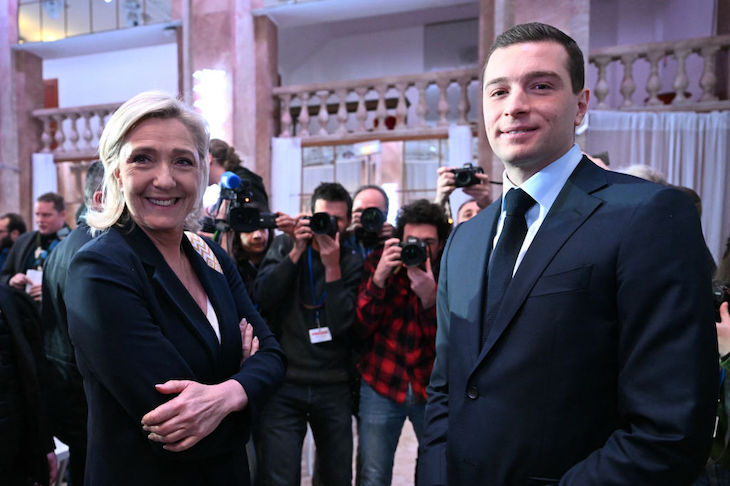A friend of mine intends to vote for the National Rally in June’s European Elections. That in itself is nothing unusual – 13.2 million people voted for Marine Le Pen in the 2022 presidential election and 88 of her MPs were then elected to parliament in the legislative elections.
What’s more unusual about my friend is that she is a French Algerian.
She tells me that she is not an exception among her milieu. It’s the lawlessness, she explains, and the indifference of Emmanuel Macron and his government to thugs, extremists and drug dealers, who make life so miserable for the hard-working and law-abiding in the less fashionable districts of French cities.
There is a caveat to her support for the National Rally; she and her Muslim friends would never vote for Marine Le Pen. It’s the family name more than the woman herself. The legacy of Jean-Marie Le Pen, the founder of the National Rally (or National Front as it originally was), is still toxic.
But Jordan Bardella is different. The 28-year-old president of the National Rally is the party’s candidate in the European elections, and it’s he who attracts my friend. Like her, Bardella comes from Seine-Saint-Denis, the impoverished Departement just north of Paris.
It is one of several weapons in Bardella’s armoury. When he talks of the hardship faced by disadvantaged members of society, he has an authenticity that none of his rivals can match. Bardella was raised on a housing estate by a single mum, an immigrant, incidentally, from Italy.
Another pull for voters is Bardella’s youth. In a recent phone-in a young man from the south of France urged Bardella to run for the presidency in 2027 because he would have his vote, and that of his friends, all of whom believe he can reinvigorate France. However, added the caller, somewhat to Bardella’s embarrassment: ‘We vote for you, not your party, because you speak to the youth.’
In the annual list of most popular French personalities, only one politician made the top 50 in 2023: Bardella at number 30. His appeal cuts across class, sex, age and ethnicity. The middle-aged builder working on my house in Burgundy is also a fan.
The Bardella phenomenon is a problem for the French elite. The nomination of the 34-year-old Gabriel Attal as Prime Minister was regarded by some commentators as Macron’s ‘anti-Bardella’ strategy. But so what if they’re both Millennials? Ideologically they are poles apart, one a bourgeois progressive and the other a working-class ‘populist’, the term applied to anyone who challenges the progressive dogma.
The arrival of Attal as PM has done nothing to change the intention of voters ahead of the European elections; a poll this week reported that the National Rally’s lead over Macron’s Renaissance party is now 12 per cent, up 1.5 per cent on a similar poll at the start of the month.
What is a problem for the French elite is also a conundrum for Europe’s centrists, whether they’re politicians or journalists. The German newspaper Die Zeit recently published an article warning that Europe was at ‘risk of a shift to the right in the European elections’, something it attributed to ‘xenophobia, Euroscepticism and the exploitation of resentment.’
There was no evidence to back up this sweeping statement, and polls tell a different story. In France, they place purchasing power and rising costs as the principal preoccupations of National Rally voters, as in Germany.
These are not issues for Europe’s elite, who don’t have to worry whether they’ve got enough money to make it to the end of the month. There are myriad reasons why the continent’s farmers are on the warpath but a common thread is their diminishing income this century. Nearly one in five farmers in France lives below the poverty line.
In 2008 the Eurozone and the US had comparable gross domestic products (GDP) of $14.2 trillion and $14.8 trillion in today’s prices; in 2023 the eurozone’s GDP had edged up to just over $15 trillion, while America’s stood at $26.9 trillion. If France was a US State its GDP per capita would rank it between Idaho and Arkansas, respectively 48th and 49th. Germany be the 39th most prosperous, just behind Oklahoma.
These are statistics never mentioned by Europe’s elite. Instead, the likes of Stéphane Séjourné, the newly appointed French Foreign Minister, resort to scare-mongering, warning that a vote for the right in Europe’s elections will make Europe ‘ungovernable’
But the EU is barely governing under its present centrist coalition. It is economically inept and it is institutionally incapable of stemming immigration. Last week Frontex, the EU border agency, disclosed that there were 380,000 irregular entries into Europe in 2023, a 17 per cent increase on the previous year and the highest number since 2016.
In an interview this week with a German newspaper, the head of Frontex, Dutchman Hans Leijtens, admitted that Europe has lost the battle to defend its borders, and people must accept the fact. ‘This talk of “stopping people” and “closing borders” cannot be our narrative all the time,’ he said. ‘Nothing can stop people from crossing a border, not a wall, not a fence, not a sea, not a river.’
With the battle lost, Leijtens explained that his job now was to ‘strike a balance between effective border management and respect for fundamental rights’.
It was a remarkably candid admission by the man charged with protecting Europe’s borders, but from the EU’s point of view perhaps not the wisest thing to say five months from elections.
What about the fundamental rights of Europeans, the majority of whom – as polls regularly find – are opposed to mass and uncontrolled immigration: doesn’t their voice count?
Maybe Europe will become ‘ungovernable’ if voting goes the way of the right in June. But tens of millions of Europeans would prefer an ungovernable EU to one that governs them with arrogant indifference and leaves them impoverished and insecure.







Comments